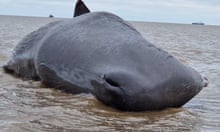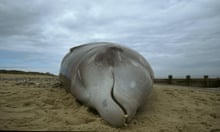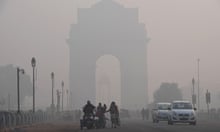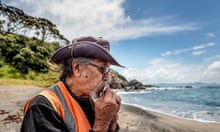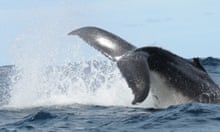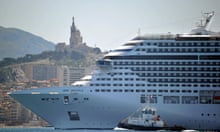A dead whale that washed ashore in eastern Indonesia had a large lump of plastic waste in its stomach, including flip-flops and 115 drinking cups, a park official has said, causing concern among environmentalists and government officials in one of the world’s largest plastic polluting countries.
Rescuers from Wakatobi national park found the rotting carcass of the 9.5 metre (31ft) sperm whale on Monday near the park in Southeast Sulawesi province after receiving a report from environmentalists that villagers had surrounded the dead whale and were beginning to butcher the rotting carcass, park chief Heri Santoso said.
Santoso said researchers from wildlife conservation group WWF and the park’s conservation academy found about 5.9kg (13lbs) of plastic waste in the animal’s stomach containing 115 plastic cups, four plastic bottles, 25 plastic bags, two flip-flops, a nylon sack and more than 1,000 other assorted pieces of plastic.
“Although we have not been able to deduce the cause of death, the facts that we see are truly awful,” said Dwi Suprapti, a marine species conservation coordinator at WWF Indonesia.
She said it was not possible to determine if the plastic had caused the whale’s death because of the animal’s advanced state of decay.
Indonesia, an archipelago of 260 million people, is the world’s second-largest plastic polluter after China, according to a study published in the journal Science in January. It produces 3.2 million tons of mismanaged plastic waste a year, of which 1.29m tons ends up in the ocean, the study said.
Luhut Binsar Pandjaitan, Indonesia’s coordinating minister of maritime affairs, said the whale’s discovery should raise public awareness about the need to reduce plastic use, and had spurred the government to take tougher measures to protect the ocean.
“I’m so sad to hear this,” said Pandjaitan, who has campaigned for less use of plastic. “It is possible that many other marine animals are also contaminated with plastic waste and this is very dangerous for our lives.”
He said the government was making efforts to reduce the use of plastic, including urging shops not to provide plastic bags for customers and teaching about the problem in schools nationwide to meet a government target of reducing plastic use by 70% by 2025.
“This big ambition can be achieved if people learn to understand that plastic waste is a common enemy,” he told The Associated Press.
